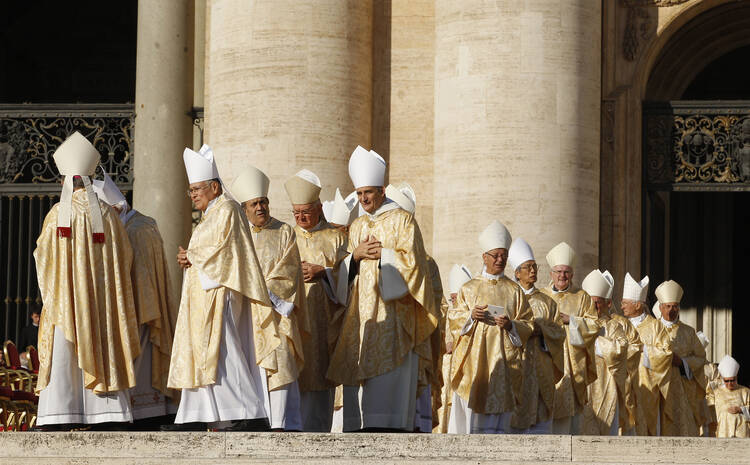Over a remarkable two-week period in Rome this October, church leaders from around the world met to talk about issues that confront and even diminish modern family life. And as in many modern families, the discussion at the Synod of Bishops on the Family at times became heated, disagreements became apparent and much was left unsaid at the table to be taken up at the next family gathering, a year from now in Rome.
At the conclusion of this planning assembly, Pope Francis addressed the synod fathers, encouraging them as they continue this exploration of family. It is critical to the future of the church that we all do so with open minds and merciful hearts. Over the next 12 months, the whole church will reflect on what happened at the synod. Challenging issues remain to be deliberated over together in love and hope, sensitive to the Spirit and the abiding wisdom of mercy.
As startling as some comments and statements were that emerged from these first conferences, nothing in church doctrine has changed. The midterm and final statements from the synod have no doctrinal force. After this October opening, the time for the real work has come.
How shall that work be conducted?
The world was astonished by the assembly’s open discussions, encouraged by Pope Francis, and by the unprecedented transparency of these initial Vatican proceedings. The synod fathers are to be commended for that refreshing honesty and fearlessness. That frankness and transparency should continue throughout the coming year of dialogue.
Charity and courtesy should also be hallmarks of this continuing “family” discussion, whether conducted online or face-to-face in parish or diocesan meeting halls. The Catholic press worldwide should use this year as an opportunity to reinvigorate the contribution it alone can make in reaching Catholic families.
For Catholic bishops, listening makes a good beginning. One model worth emulating is a diocesan synod, like the one convened by Bishop Frank Caggiano of the Diocese of Bridgeport to discuss the questionnaire distributed last year by the Roman Curia as a global conversation starter for the synod. Devising new surveys or fashioning other methods of direct consultation with the faithful should be a component of the coming year of dialogue.
But church leaders, like all of us, need to speak with marginalized families themselves where they live and struggle. Overwhelmed by poverty or barely juggling work and family commitments, not all members of the church family can come to parish meeting halls. But they need to be heard from too. Church shepherds should seek them out at food pantries, homeless shelters and perhaps a neighborhood restaurant or two, where they might also meet family members who have drifted away and may be looking for a reason to come home.
This is a dialogue that must include other voices that have been subdued in the past. The more confident presence of African bishops should be welcomed. In fact, the vibrant participation of representatives from all the fast-growing parts of the Catholic world needs to be encouraged.
Similarly, a place must be found to hear the experience and wisdom of the family members who are the subjects of so many ongoing dialogues. Surely if someone is going to be talked about, it is unjust to leave that person out of the conversation. The church cannot discuss outreach to gay and lesbian people, to divorced or remarried couples without first hearing from these beloved brothers and sisters.
But neither should the Synod on the Family be reduced to the “headline” issues that so preoccupied the global media. Cardinal Christoph Schönborn of Vienna has rightly urged both the media and the church to resist focusing all synodal energy on “irregular” relationships and sacramental mitigation. The church is global, and so are its concerns. Families are being wearied and warped by economic inequities in the West, torn apart by conflict and crime in the Middle East and Central America and assailed by disease and poverty in Africa. Surely these matters should be at least as pressing a concern for a merciful church.
Closing out the synod on Oct. 18, Pope Francis wisely warned of a number of temptations that can sidetrack healthy dialogue: hostile inflexibility, do-goodism that can be destructive, the transformation of spiritual sustenance into unbearable burdens, abandoning the will of the Father for the sake of the expedient and exploiting the deposit of faith or ignoring complicated realities for self-serving ends.
There are other temptations to keep in mind: the temptation to fear and timidity, the temptation to trade hope for despair. Pope Francis reminds us to remain attentive to a God who is not afraid of new things. Over the next 12 months, the church should follow his advice and remain attuned to the Father, who is “continuously surprising us, opening our hearts and guiding us in unexpected ways.”









” There is one (embodied) human nature that men and women equally share in human personhood, and the redeemed and baptized human body, male and female, is what makes our Lord Jesus Christ visible as an incarnate divine Person.”
* * * * *
”John Paul II's Theology of the Body provides a refreshing synthesis of egalitarian and complementarian ideologies. It shows that the original unity of man and woman was not completely destroyed by original sin and is fully restored by the redemption of the body.”
Sorry, but there’s a contradiction between these two statements. John Paul II’s overly romantic “Theology of the Body” is based on a theory of “natural law” that is unscientific and informed only by Scriptural literalism; the “complementariness” is purely anatomical and not particularly psychological or emotional, and, in its primitive fundamentalism, it very much resembles the posture of your other commentator here who believes that there were no women called by Christ to be purveyors of His Gospel—notwithstanding all the scholarship of modern Scriptural Exegesis, which has pretty much demolished that patriarchal postulate of a politicized early Church hierarchy.